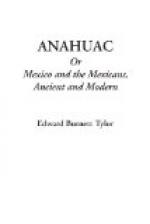Mexican law well administered is bad enough, not essentially unjust, but hampered with endless quibbles and technicalities, quite justifying the Spanish proverb, “Mas vale una mala composicion que un buen pleito,”—a bad compromise is better than a good lawsuit. As things stand now, the law of any case is the least item in the account, there are so many ways of working upon judges and witnesses. Bribery first and foremost; and—if that fails—personal intimidation, political influence, private friendship, and the compadrazgo. Naturally, if you have a lawsuit or are tried for a crime, you should lay a good foundation. This is done by working upon the Juez de primera instancia, who corresponds in some degree to the Juge d’instruction in France. This functionary is wretchedly paid, so that a small sum is acceptable to him; and, moreover, the records of the case, as tried by him, form the basis of all future litigation, so that it is very bad economy not to get him into proper order. If you do not, it will cost you three times as much afterwards. If your suit is with a soldier or a priest, the ordinary tribunals will not help you. These two classes—the most influential in the community—have their fuero, their special jurisdiction; and woe to the unfortunate civilian who attacks them in their own courts!
Don Miguel Lerdo do Tejada, whose sense of humour occasionally peeps out from among his statistics, remarks gravely that “the clergy has its special legislation, which consists of the Sacred Volumes, the decision of General and Provincial Councils, the Pontifical Decretals, and doctrines of the Holy Fathers.” Of what sort of justice is dealt out in that court, one may form some faint idea.
One of our friends in Mexico had a house which was too large for him, and in a moment of weakness he let part of it to a priest. Two years afterwards, when we made his acquaintance, he was hard at work trying, not to get his rent, he had given up that idea long before, but to get the priest out. I believe that, eventually, he gave him something handsome to take his departure.
I have often quoted Don Miguel Lerdo de Tejada, and shall do so again. His statistics of the country for 1856 are given in a broad sheet, and seem to be generally reliable. The annual balance-sheet of the country he sums up in three lines—
Annual Expenditure . . . . . . 25,000,000 dollars. Annual Revenue . . . . . . . . 15,000,000 dollars. ---------- Annual Deficit . . . . . . . . 10,000,000 dollars.
The President of the Ayuntamiento was a pleasant person to know, among the dishonest, intriguing Mexican officials. He received but little pay in return for a great deal of hard work; but he liked to be in office for the opportunities it afforded him of improving the condition of the poor of the city. It was a sight to see the prisoners crowd round him as he entered the court. They all knew him, and it was quite evident they all considered him as a friend. In what little can be done for the ignorant and destitute under the unfavourable circumstances of the country, Don Miguel has had a large share; but until an orderly government, that is, a foreign one, succeeds to the present anarchy, not very much can be done.




